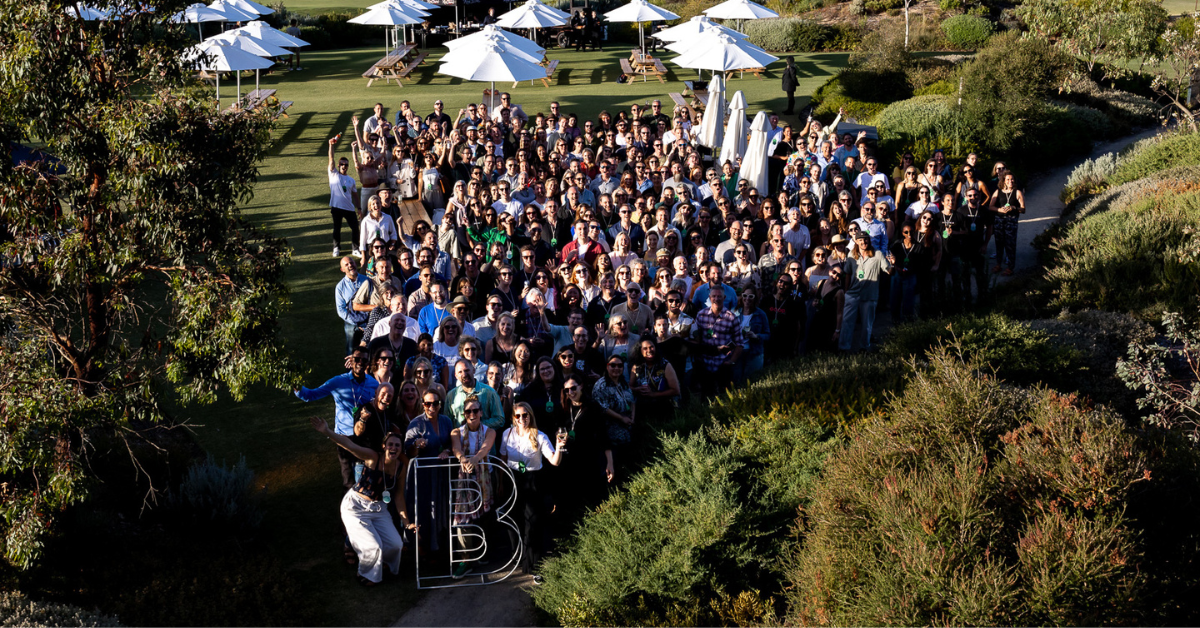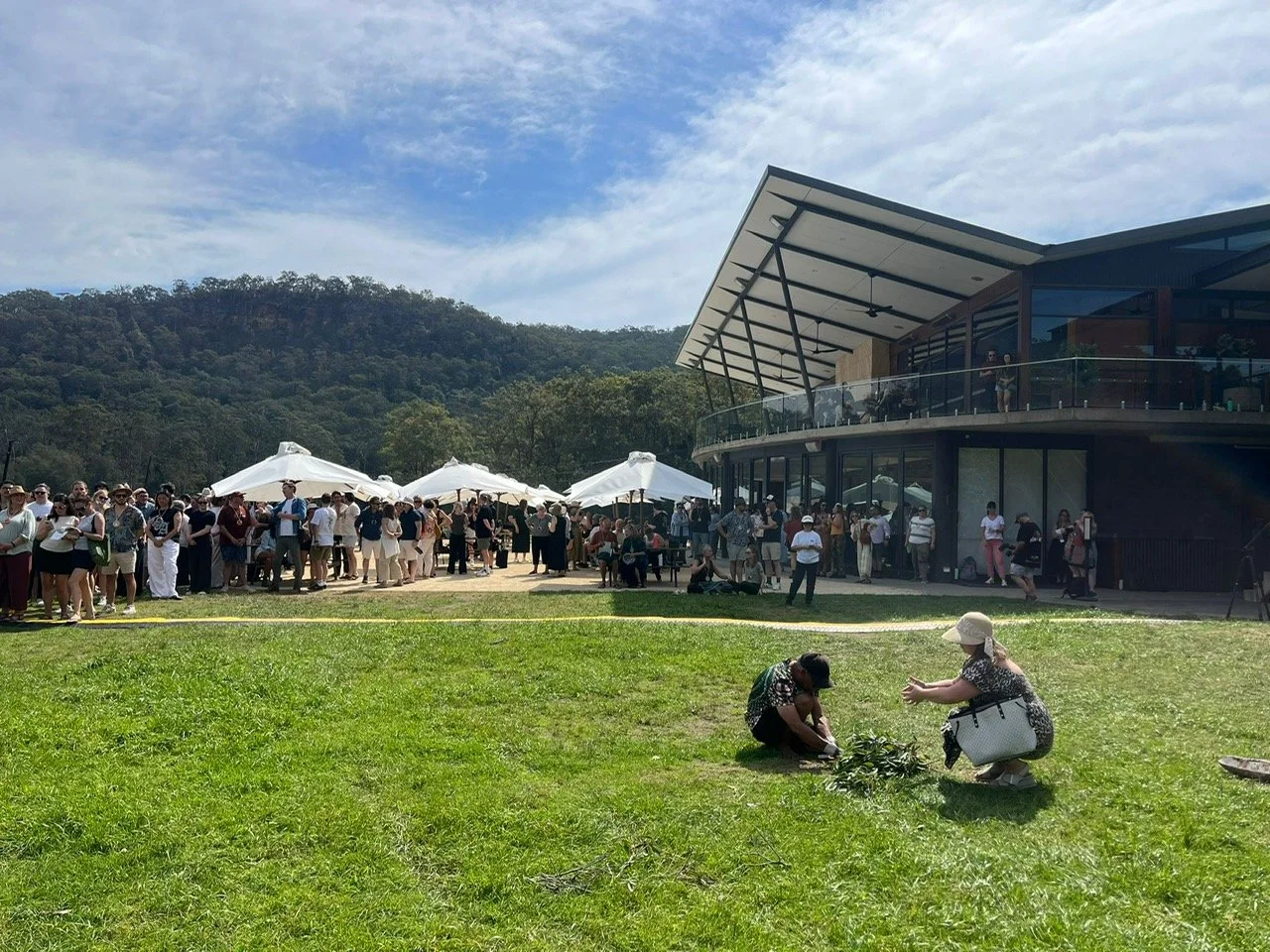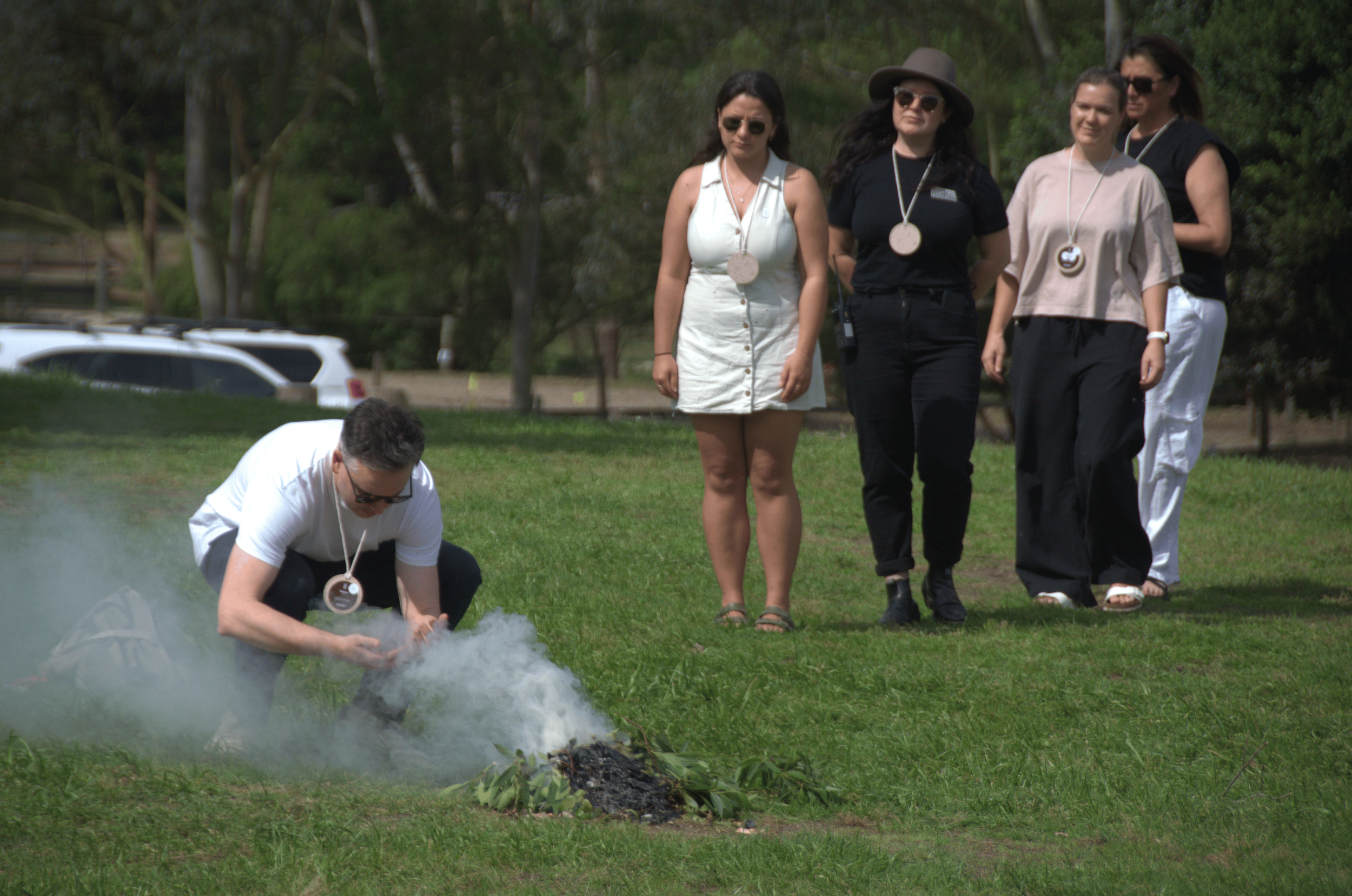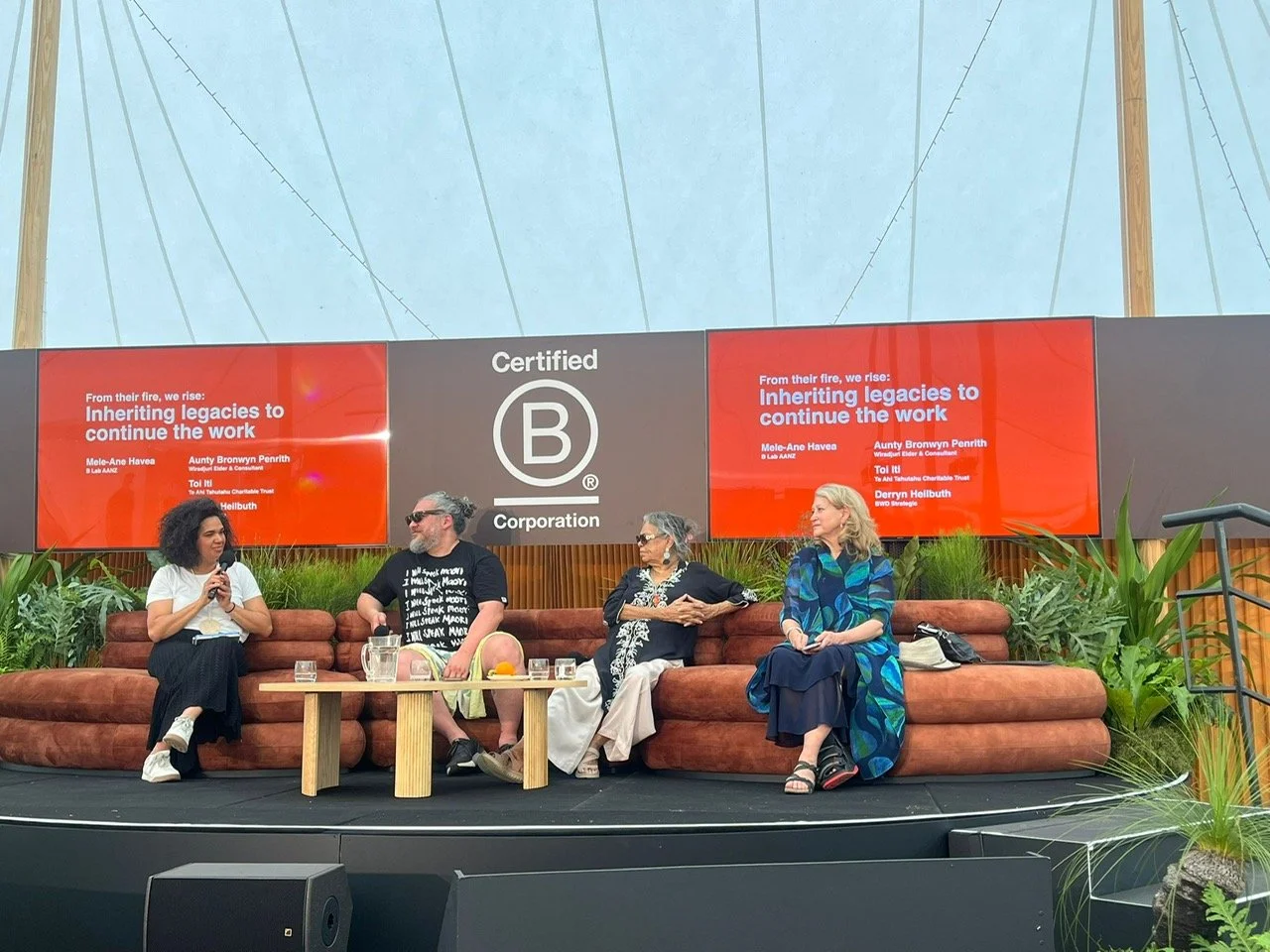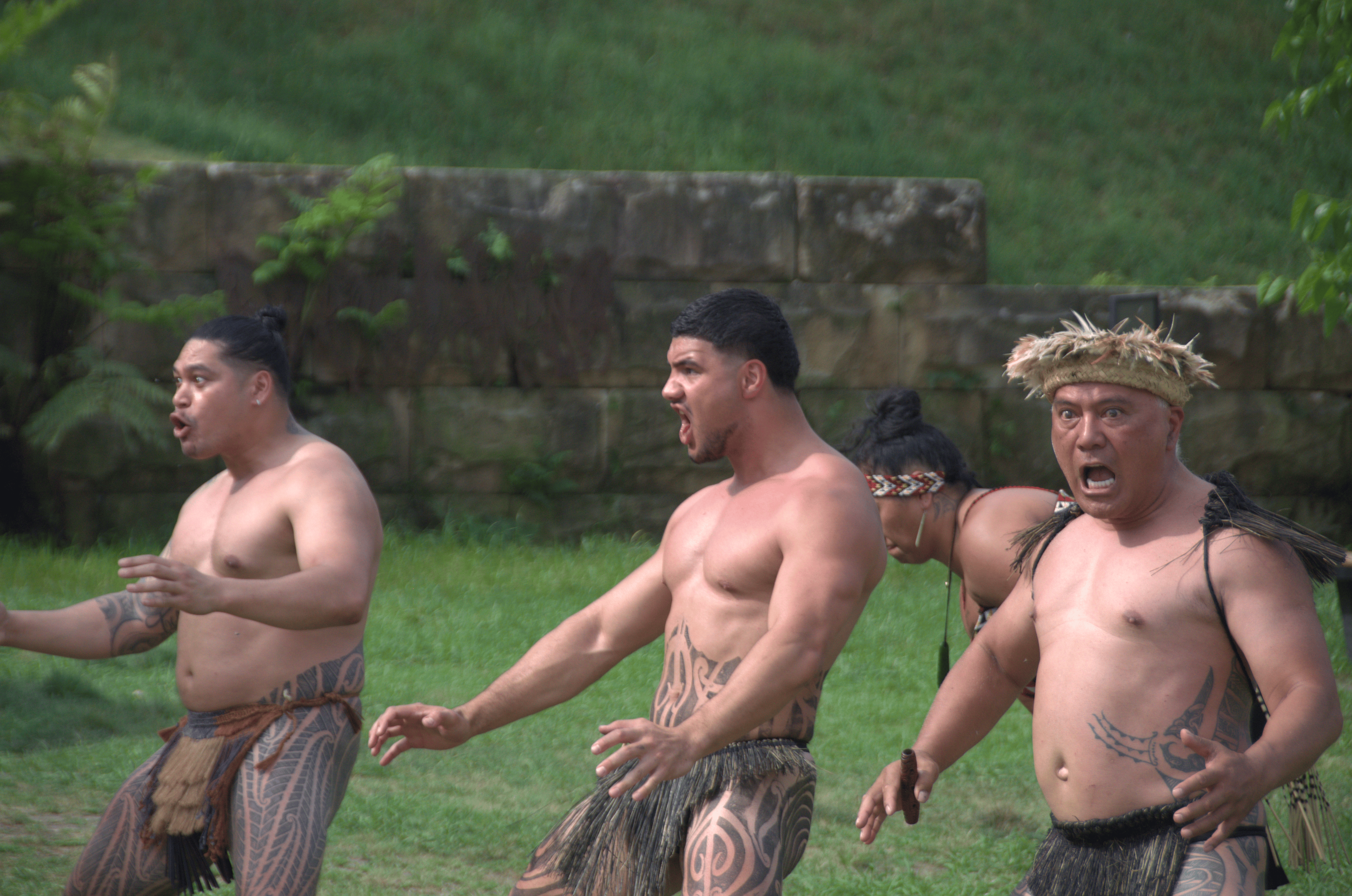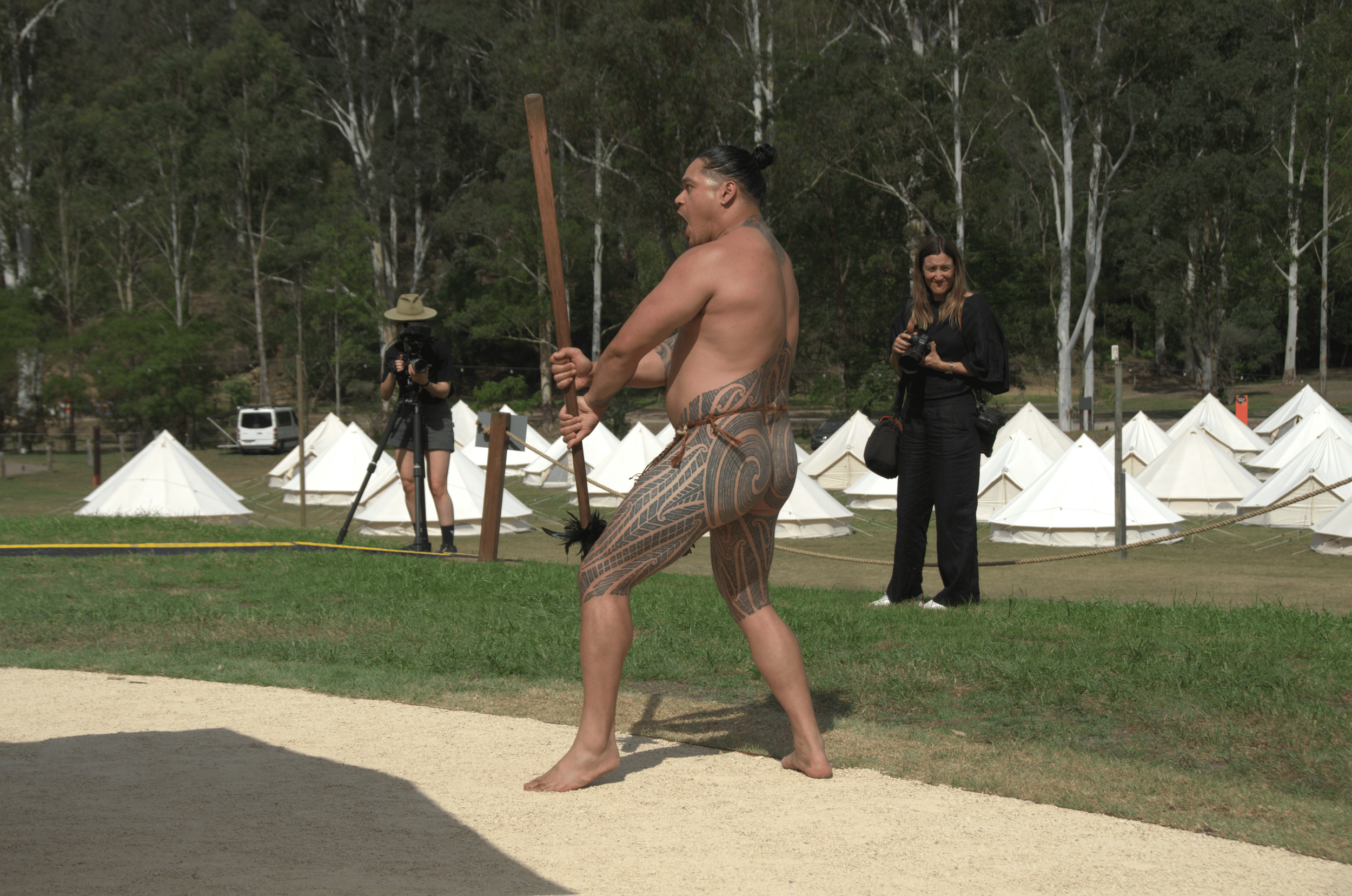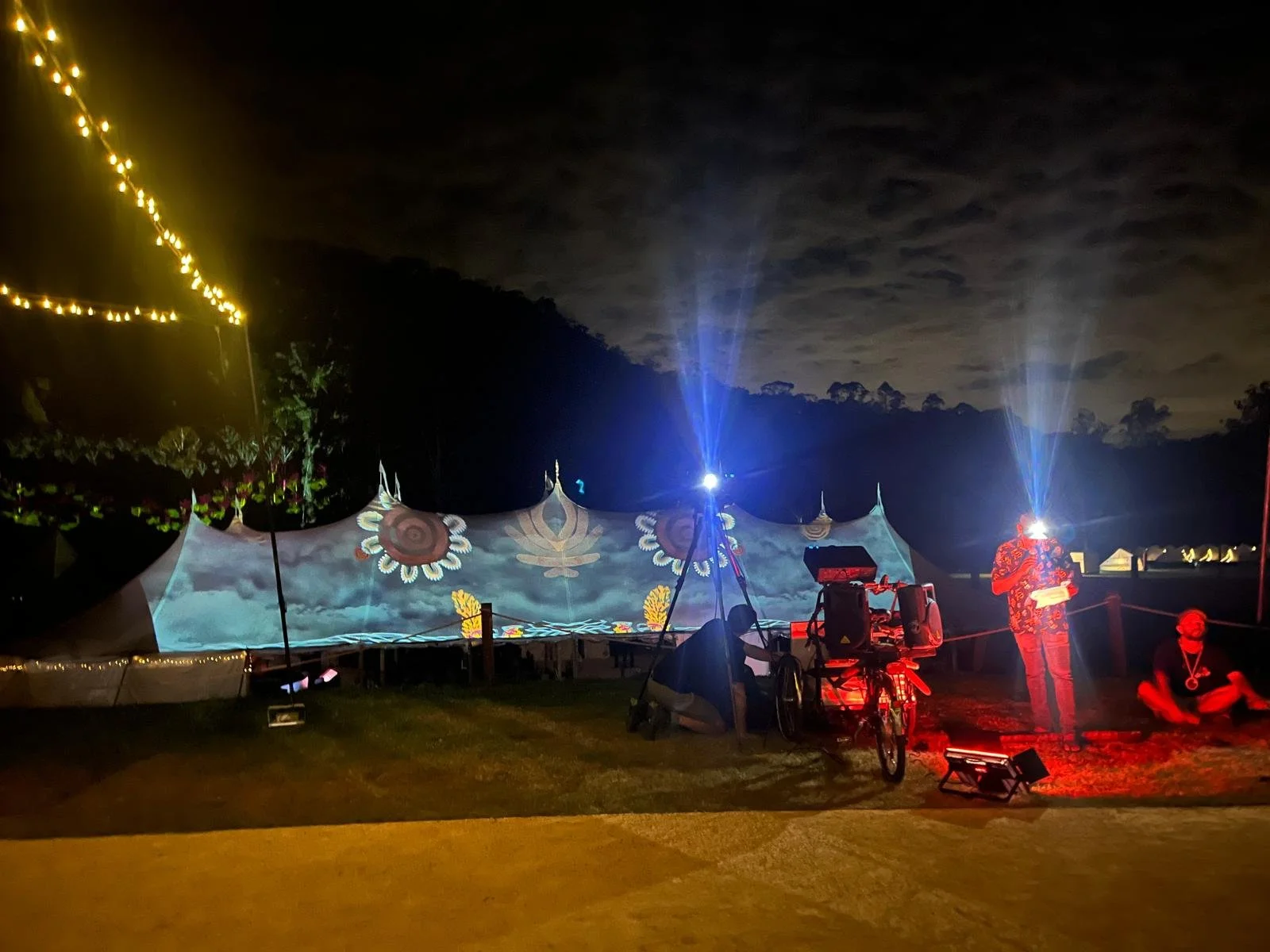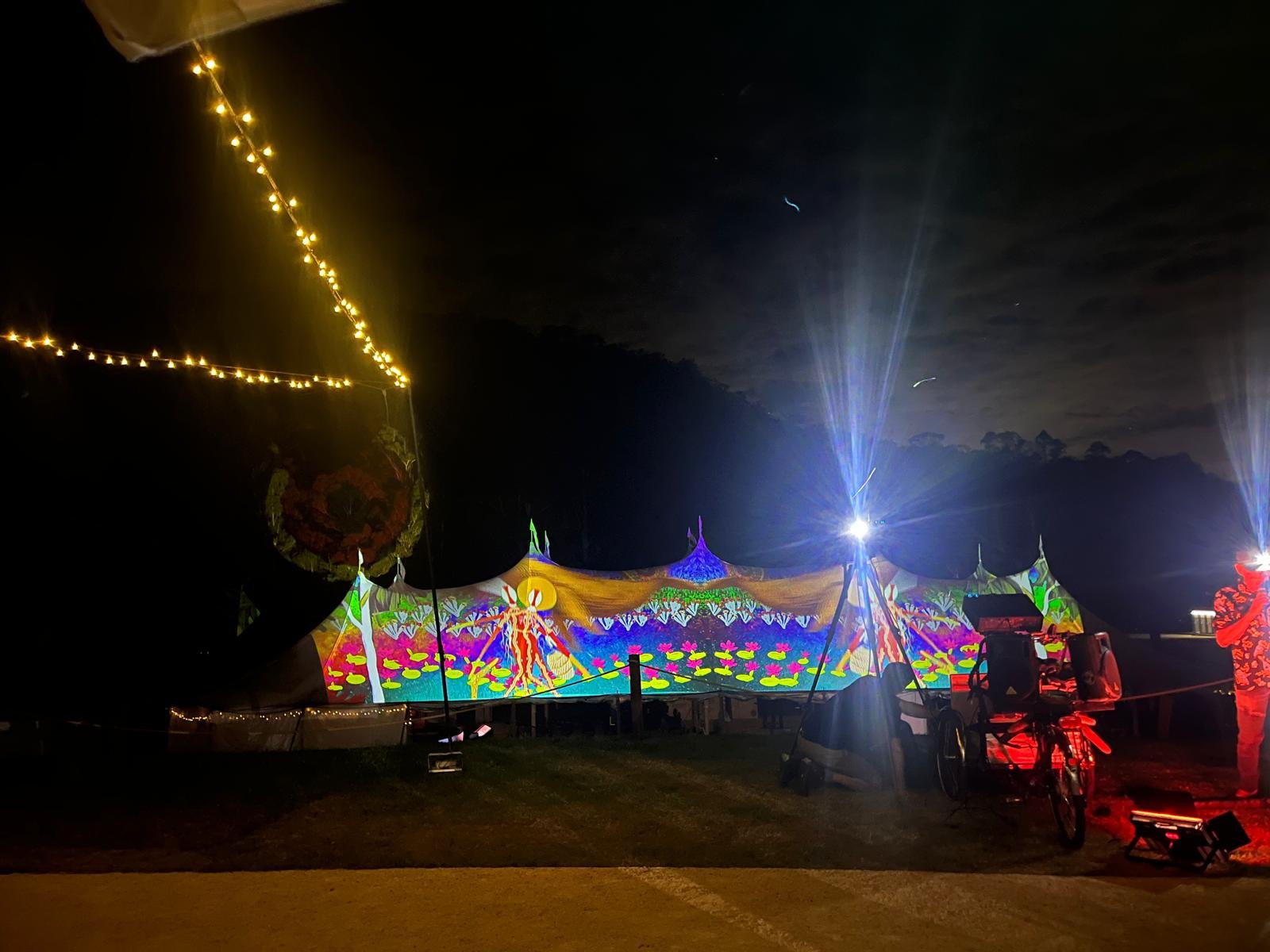Three Days at Assembly: EarthWize's First Time Among Our People
October 20-22, 2025, Glenworth Valley, NSW
Sam just got back from Assembly—B Lab AANZ's gathering of B Corps from across Australia and New Zealand. Three days, two nights, 130 people from over 100 certified B Corps, all gathered at Glenworth Valley just outside Sydney. It was EarthWize's first time attending.
We're not going to pretend it was all Instagram-perfect. It was hot. Really hot. And there were flies—the kind that make outdoor workshops feel like character-building exercises. But here's the thing: when you're surrounded by people who actually understand why you give a damn about supply chain ethics and circular economy models, you barely notice you're swatting insects while discussing regenerative business practices.
Sam came back energised in a way that's hard to fake. Not the "I went to a conference and collected business cards" energy. The real thing.
An Indigenous smoking ceremony is a traditional Aboriginal and Torres Strait Islander practice that uses the smoke from burning native plants to cleanse and purify people and places of negative spirits, promote good health and well-being, and connect with country.
What Assembly Actually Is
Assembly is where B Corps gather to connect, learn, challenge each other, and remember why they're doing this. Part conference, part networking, part celebration, part reality check. B Lab AANZ organises it, and they brought together keynote speakers, workshop facilitators, roundtable discussions, and enough free time to actually have meaningful conversations.
The attendees weren't just from Australia. There were B Lab staff from Taiwan, Korea, Philadelphia, and Europe. The movement is bigger than we sometimes remember when we're heads-down just trying to get through another week of operations.
For context: EarthWize became a B Corp in August 2025, and we've been doing this work—chemical-free commercial cleaning, above-award wages, direct employment, environmental action—for two years (2). But being certified and being connected to the broader B Corp community are different things. Assembly was our chance to stop being an island.
The Moments That Stuck
Ruby Rogers and the Hope We Needed
The speaker who hit hardest was Ruby Rogers. She's 16 years old. A performance artist with music in her DNA (Jimmy Barnes’ granddaughter), recently invited to be one of only eight schoolchildren globally to participate in Damon Gameau's documentary Future Council.
Ruby spoke about the environment with raw emotion and conviction that made the room go quiet. Not the rehearsed passion of a TED Talk—the real thing. The kind that comes from genuinely caring about inheriting a livable planet. She gave a room full of business leaders hope that maybe, just maybe, the next generation will do better than we have at protecting what matters.
Here's the thing: hearing a teenager speak truth to a room full of adults who are supposedly "doing good business" hits different. It's a reminder that we're not doing this work for the scoreboard. We're doing it because the stakes are real and the next generation is watching.
Late Night by the Fire Pit
This might have been Sam's favorite part: the late-night conversations around the fire pit. Picture a bunch of B Corp founders and directors, definitely past optimal decision-making hours, debating everything from toilet paper sustainability to trying to explain their businesses in one sentence. There was fact-checking of increasingly strange statistics that almost always proved wrong. There was laughter. There was probably some alcohol-induced philosophy.
It sounds trivial until you realise how rare it is to sit around a fire with people who don't think you're weird for caring about these things. People who understand the exhaustion of fighting for better business practices in industries that mostly don't care. People who've also stayed up late wrestling with the same impossible questions about balancing profit with purpose.
(And yes, before you ask—the toilet paper debate absolutely mattered in the moment.)
Cornering a Fashion Industry Warrior
Sam had a conversation with Athena from DISSH that stuck with him. He cornered her after hearing her speak on the panel "Is Sustainable Fashion an Oxymoron?" His questions were blunt: How do you work in such an environmentally destructive industry without becoming demotivated? And honestly, what purpose does the fashion industry serve beyond making money?
Her answer was simple and challenging: it's better to fight for change from within than to write the whole industry off as hopeless. Yes, fashion has serious problems. But women's bodies change, their taste evolves, and there's a real need being met—even if it's being met badly right now. Athena still loves fashion, but she's far more conscious of impact. She's staying in the fight.
Not every B Corp gets to work in an industry that's easy to defend. Some are choosing the hard path of transformation from inside systems that desperately need changing.
The Connections That Actually Matter
Sam had conversations with people from North Melbourne FC, Sussan-Sportsgirl (who explained their project creating four 100% recyclable garments with no price targets—letting designers actually design for sustainability instead of cost), The Commons in Sydney, and Bank Australia (that conversation started at Sydney airport before Assembly even officially began).
But here's what matters more than any potential business outcome: these are organisations facing similar challenges, asking similar questions, fighting similar fights. The value isn't in converting conversations into contracts. It's in building relationships with like-minded organisations, learning from shared experiences, and being better because of what we learn and what we can apply.
Take Radish, the catering company that provided all the food at Assembly. They're basically the catering version of EarthWize, exceptional quality outcomes that come with a premium price. Even other B Corps have to think hard about the cost differential. It's validating and challenging at the same time. We're not alone in trying to prove that quality and ethics can coexist at a fair price point.
Most attendees were from Sydney, not Melbourne. That's fine. The B Corp community doesn't work like traditional networking. You don't measure success by immediate ROI. You measure it by whether you learned something that makes you better at what you do, whether you built relationships that'll matter in a year or three years, whether you came away with ideas that'll shift how you think about your business.
Sam did. We did.
What We Didn't Expect
The Indigenous focus was stronger than anticipated—discussions of Aboriginal and Aotearoa (New Zealand Māori) peoples' connection to land, their struggles, their hopes for the future. These aren't conversations we're often exposed to in day-to-day business, and they matter. They reframe what stewardship actually means when you're thinking beyond quarterly results.
There were also discussions about Teal organizational principles—flat hierarchies, distributed decision-making, giving up control. We admit we’re not sure how we'd handle that in our business. It's uncomfortable territory. But that's kind of the point of these gatherings, isn't it? They push you to think about structures you've never questioned.
The Food (Which Deserves It’s Own Section)
The food was entirely vegetarian and vegan, and it was genuinely excellent. Sam's highlight? A soup served on the first day at lunch. Thick, rich, possibly pumpkin. Just really good soup that most people walked past without thinking twice about.
Here's what matters: most attendees weren't vegetarians, but Sam heard multiple people say if they could eat like this every day, they could easily go plant-based. When the food at an event is memorable enough that people talk about it days later, that tells you something about what's possible when caterers like Radish actually care about their craft.
There was mushroom risotto. There was exceptional salsa. There were salads that weren't afterthoughts. This is what happens when quality matters more than cutting costs.
Music, Dancing and Haka
A New Zealand band called Coterie (working out of Perth) provided live music. They covered Dave Dobbyn's "Slice of Heaven," which is exactly the kind of choice that makes a B Corp gathering feel right. Azita from B Lab was the DJ—bubbly, full of energy the entire time.
The opening ceremony included a Haka. If you've never experienced one, it's hard to explain the energy. It's powerful. It's grounding. It's a reminder that business happens in a cultural context that's bigger than profit margins and growth targets.
What It Felt To Finally Be There
Sam described Assembly as arriving at a safe haven. No need to explain yourself or defend your viewpoints because everyone's basically on the same page. Every conversation was easy, carefree, comfortable.
During daily work, it's easy to feel like we're fighting alone. You're explaining why chemical-free matters, why above-award wages matter, why direct employment matters, why environmental restoration matters. You're making the case over and over that business can be different.
At Assembly, you don't have to make that case. Everyone already gets it. They're fighting their own versions of the same fight. That recharge matters—it's the difference between burning out and finding the energy to push forward for another few years.
Sam also learned something important: EarthWize isn't ahead of the curve. We're not uniquely enlightened. We're one of many businesses trying to do good work. That's actually more encouraging than being special. It means we're part of a movement, not an isolated experiment.
Would We Go Again?
Yes. Without question.
This kind of gathering is about building trust over time. You meet people, you reconnect at the next event, relationships deepen. Each Assembly strengthens the connections. There will always be new B Corps joining, new people to meet, new ideas to absorb.
But honestly, that's not even the main reason to go. The main reason is coming back energised. Remembering you're not alone. Getting reminded why this matters. Meeting 16-year-olds like Ruby who make you believe the next generation might actually fix what we've broken.
If you're a B Corp (or thinking about becoming one) and you're on the fence about attending Assembly, here's what Sam would tell you: If you can find a way to go, do it. You'll get more out of it than you expect. Bring bug spray. Embrace the heat. Show up ready to actually connect with people, not just collect business cards.
And if you're not a B Corp but you're a business owner wondering if there's a better way to run a company, there is. Assembly is proof. Over 100 Australian and New Zealand businesses showing up to share how they're making profit and purpose work together. It's messy, it's imperfect, it's challenging.
But it's possible.
We're already looking forward to the next one.

